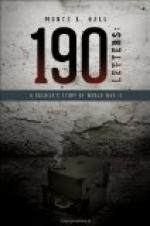2 o’clock.
Splendid weather, herald of the spring, and we can make the most of it, because in this place we are allowed to put our noses out of doors.
I write badly to-day. I can only send you my love. This war is long, and I can’t even speak of patience.
My only happiness is that during these five and a half months I have so often been able to tell you that everything was not ugliness. . . .
January 23.
. . . As for me, I have no desires left. When my trials are really hard to bear, I rest content with my own unhappiness, without facing other things.
When they become less hard, then I begin to think, to dream, and the past that is dear to me seems to have that same remote poetry which in happier days drew my thoughts to distant countries. A familiar street, or certain well-known corners, spring suddenly to my mind—just as in other days islands of dreams and legendary countries used to rise at the call of certain music and verse. But now there is no need of verse or music; the intensity of dear memories is enough.
I have not even any idea of what a new life could be; I only know that we are making life here and now.
For whom, and for what age? It hardly matters. What I do know, and what is affirmed in the very depths of my being, is that this harvest of French genius will be safely stored, and that the intellect of our race will not suffer for the deep cuts that have been made in it.
Who will say that the rough peasant, comrade of the fallen thinker, will not be the inheritor of his thoughts? No experience can falsify this magnificent intuition. The peasant’s son who has witnessed the death of the young scholar or artist will perhaps take up the interrupted work, be perhaps a link in the chain of evolution which has been for a moment suspended. This is the real sacrifice: to renounce the hope of being the torch-bearer. To a child in a game it is a fine thing to carry the flag; but for a man, it is enough to know that the flag will yet be carried. And that is what every moment of great august Nature brings home to me. Every moment reassures my heart: Nature makes flags out of anything. They are more beautiful than those to which our little habits cling. And there will always be eyes to see and cherish the lessons of earth and sky.
January 26.
Your dear letter of the 20th reached me last night. You must not be angry with me if occasionally, as in my letter of the 13th, I lack the very thing I am always forcing myself to acquire. But I ask you to consider what can be the thoughts of one who is young, in the fulness of productiveness, at the hour when life is flowering, if he is snatched away, and cast upon barren soil where all he has cherished fails him.
Well, after the first wrench he finds that life has not forsaken him, and sets to work upon the new ungrateful ground. The effort calls for such a concentration of energy as leaves no time for either hopes or fears. It is the constant effort at adaptation, and I manage it, except only in moments of the rebellion (quickly suppressed) of the thoughts and wishes of the past. But I need my whole strength at times for keeping down the pangs of memory and accepting what is.




